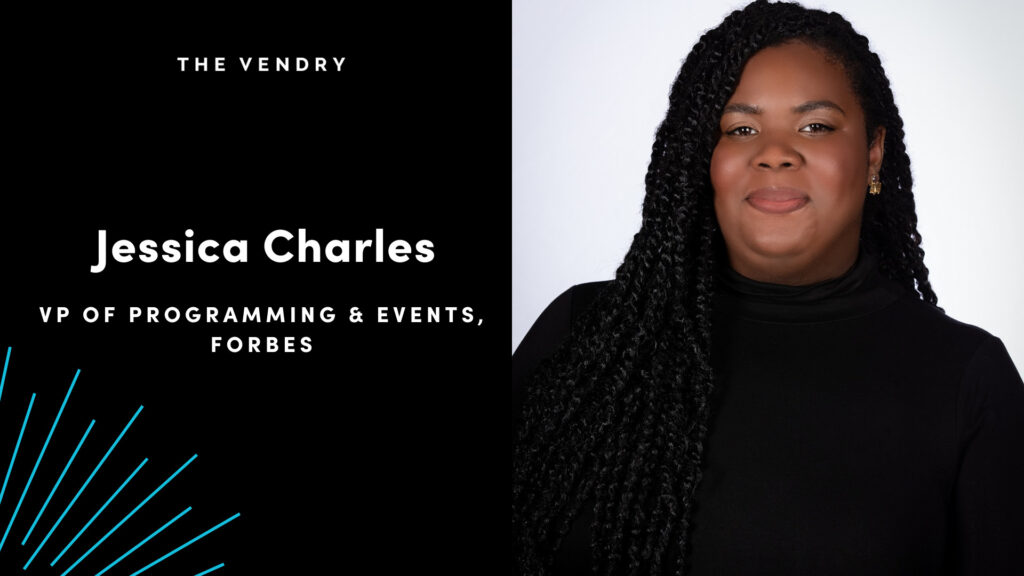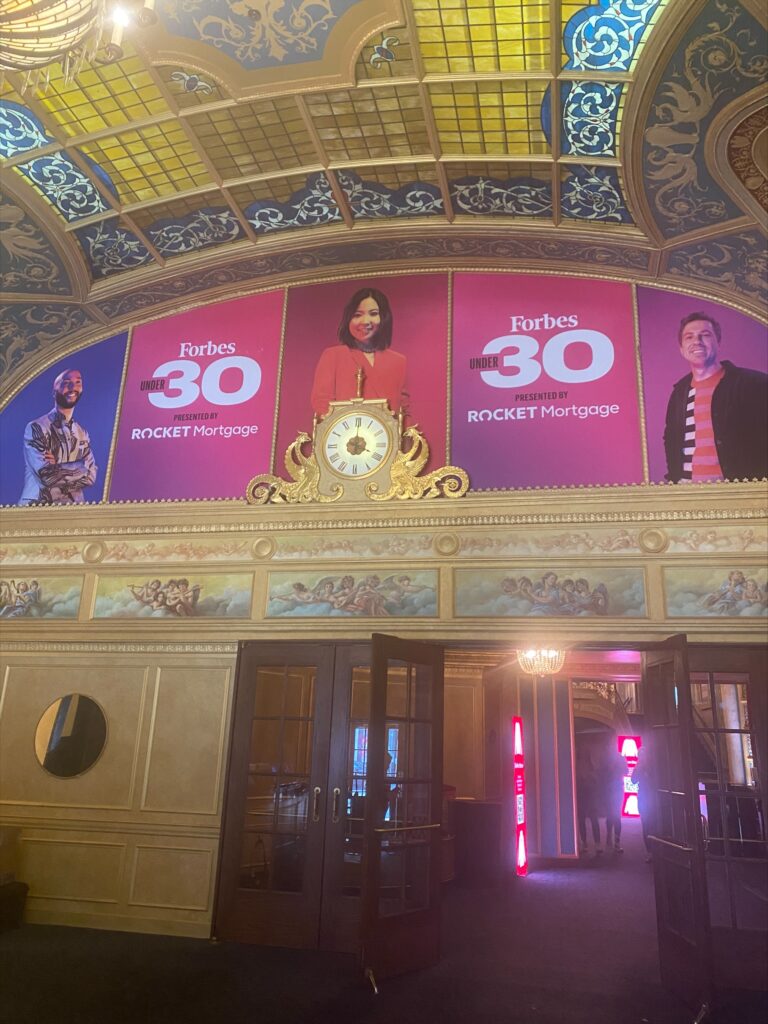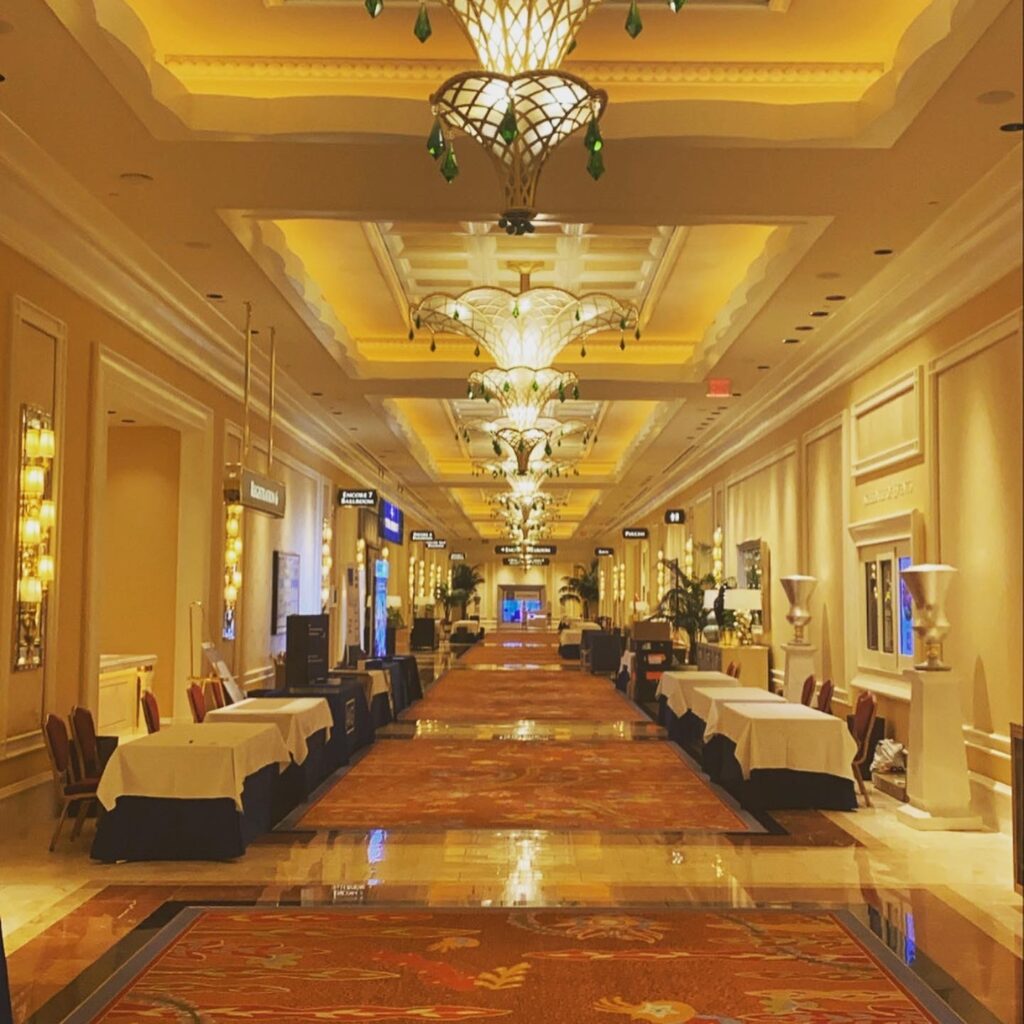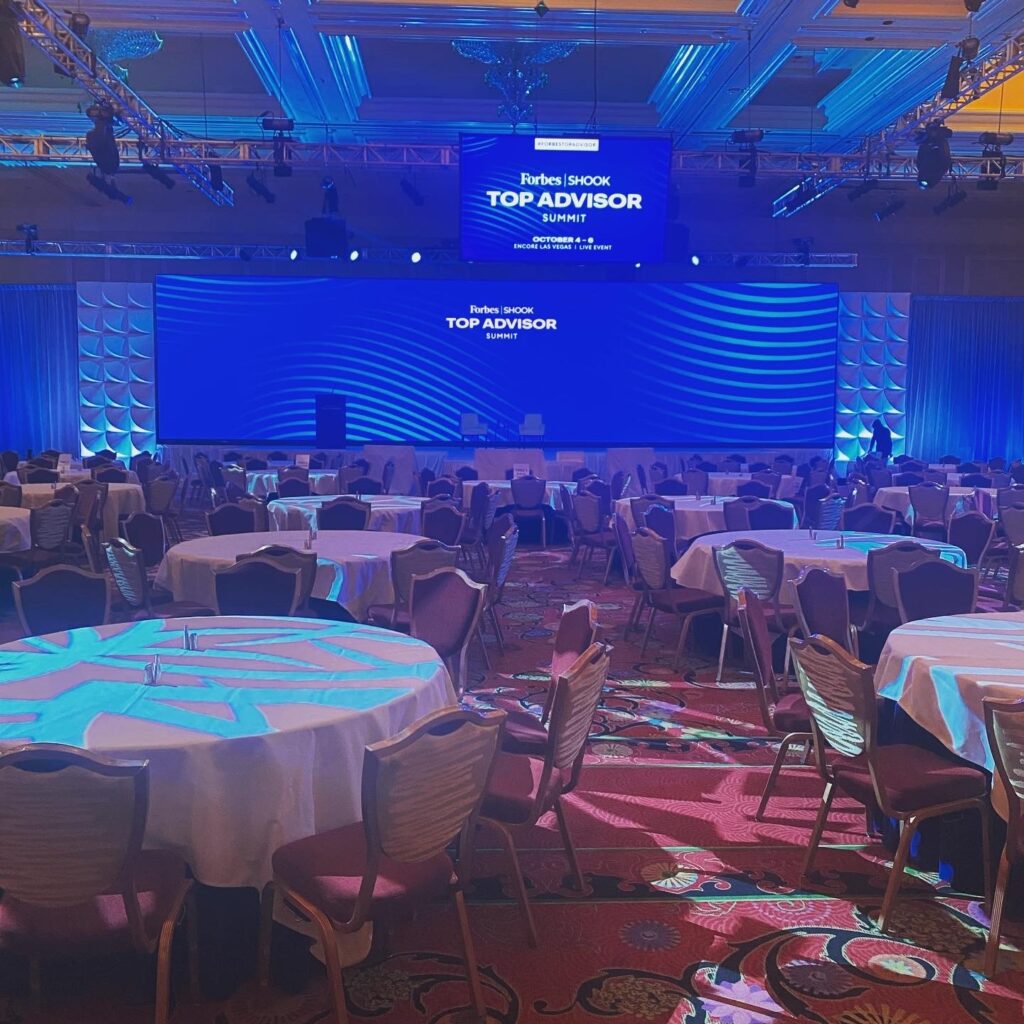
Jessica Charles is Vice President of Programming & Events at Forbes, where she’s been planning both domestic and international events since 2016. The New York-based event pro chatted with The Vendry about gaining insights into work-from-home behavior, hiring a great team, and establishing a partnership with venue operators.

Charles: I am the VP of Programming and Events, I oversee our programming and logistics team under ForbesLive which is the events arm of Forbes and executes about 70 events a year. The day to day varies a lot. It can be looking at our presale process, forecasting 2022 and what our events will look like. Right now, I have been in brainstorming mode for 2022, examining going hybrid, what the next iteration of our events look like, and what is in the pipeline and working with our group vice president on dates. Now that we're going back to in person, I have been meeting with our logistics team on what our process will now look like for in person events moving forward.
As far as programming, with the amount of events we have events in the coming year, I'm in the process of hiring an additional member of the programming team to support us. The team is also working hard on executing the rest of our events for the end of the year and working on events for 2022. Finally, I'm working on a few programming components for 2022 for some really big programs that we have running in Q1.
Charles: I look everywhere. I’ve looked at TV shows, and thought to myself, “That looks like a cool event. We should do something like that.” But in terms of now, I am on social channels like Twitter and TikTok, looking at what Gen Z is saying and what kind of events they're going to. I like to stay as creative as possible. Yes, Il pay attention to what the industry is doing, but I’m also looking at what I'm seeing people interact with, and knowing that our attention span has gotten a bit tighter than we think it is.
I also read a lot of articles about the state of the industry and what other people are saying as it relates to working from home. How long are people actually looking at their screen before they have to take a break? I look at TikTok a lot because they talk about corporate burnout, and everybody's always talking about ‘I do 25 meetings in front of my computer, and then I take a five-minute break.’ That's important for us to know because we're doing virtual events. So, I have to go to our team to say we can't do three-hour events. We should be cutting them to an hour, an hour and a half because we're seeing these trends, and people are not staying in front of their computer for as long as they were in the beginning of the pandemic. It's just not happening. And then I'm always looking for really cool things that we can do on site just to zhuzh it up a bit.
We recently did our Under 30 Summit in person, and we did these roundtables that were so well received. There were different people in a group with chairs, no heavy programming, and it was packed. That's something that I want to try for our C-Suite event in a more informal way that we're taking the programming off the stage, adding in networking, and giving the audience a chance to create their own conversation based on what is most pressing to them at that time.
Charles: There are two things. One is that I can always find a solution to a problem. I’m very much a problem solver. The second is I'm very calm. Some have said I am scary calm because things are happening and you would never know. We've had major things happen at events, and I've calmly walked up to people and said, ‘We have a situation outside. Can you come with me?’
I never want to scare the audience, especially if it's not that serious. It's okay. We will be okay. If there's an emergency, I'd rather handle it calmly. It happened today. I was rushing and I was trying to finish things, and I was like, I need to calm down because I'm actually adding stress and time to this, but if I calm down, I'll get there faster, and that's exactly what happened.
Charles: In October, we executed our first in-person events a week apart from each other in two different cities. The Forbes/SHOOK Top Advisor Summit was in Las Vegas and the Forbes Under 30 Summit was in Detroit. We worked in in tandem across the organization in order to execute.. Being in different states, there were different mandates and rules and we had to ensure that all our executive stakeholders within the organization were on board. There were so many discussions across the organization and it was worth it, because in the end we were able to gather our attendees, speakers, partners, and employees safely.
They were a labor of love to get executed. But I think we were so successful in their execution. It was a real example of the importance of convening in person and the importance of getting people in a room to discuss and disseminate information, as well as network. It was so exciting to see.


Charles: I think you need a good events team. You can do an event at the most fantastic venue and have the best speakers, but if your events team is not creative, if they are not innovative, if they are not excellent at their job and know every minute detail of that space—from how are the attendees walking in? What is their first point of contact? What does it look like for them to walk from registration to their table or from registration to the networking area? If your team is not detail-oriented, the event won’t be great.
That is so important, and I think some people rest on their laurels a bit and they're like, ‘we have this beautiful space and we have a big speaker and everything is fine,’ but it's more than that. We're selling an experience. And part of what I think makes events so special is that it's a place where genius happens. There's a place where ideas are spawned. It's a place where people can get funding for an idea they have for a business they're trying to build.
I always take it very seriously, especially when it comes to the networking aspect. I want to be able to create content on stage that they resonate with and that they're inspired by, but also give enough time for our attendees to network and meet each other, plus enjoy the activations and fantastic food. All those things are so important, and I think people overlook them. I've been at events where the bathroom is in the worst place possible, and they have no alternative. Or for some reason all the food is on the lower level, but all the activations on the top level. Things like that need to be more thought through and you need to be more creative in terms of your space. I definitely think your team is key because they can turn anything into gold. If you have the right team, they're the key and the secret sauce to making an event an excellent event.
Charles: It is very much research and word of mouth. We look at their work, the diversity of their teams, and of course but never least, the cost. Versatility is crucial for us because our projects tend to change as we get closer to the event, so being able to handle change and work with us is key.

Charles: There are so many variables. One of them, of course, being location, and we do have a long process... but for the most part, it's so important that the venues have all of their details worked out mostly because we are not able to do site visits. If the venue doesn't have photos or floor plans that's more work. We usually gravitate more towards venues that are locked in and have those assets that we can put together proposals for clients or executive stakeholders to show them the merit of the venue.
Of course, cost is so important too. What will help them in the RFP is really based on how communicative they are. I'm a big proponent of how they treat you in the presale process is how they treat you in the post-sale process. I'm a big believer of that. And that sentiment stretches across the industry. Being able to work with us, especially in these uncertain times—we have force majeure clauses, we have different clauses for COVID, and being willing to work with us and understand that this is important for all parties. It really helps if they're flexible and if they understand that we are in an uncertain area and time. We need true partnership and partners who understand that even though there is that client relationship, we still are in this together when it comes to this event.
Charles: I graduated school in the recession, at the height of the recession, and my degree was in journalism with a concentration in PR. I was a marketing intern at the Simon Property Group at the Burlington Mall and I worked at a website called boldfacers.com, and both of them did events. When I graduated, there were no jobs, and I took the first thing that came along. I worked at a student exchange organization as a contractor in New York. After that contract ended, they were hiring in Baltimore for a hosting coordinator, which is essentially us finding homes for students who are coming from abroad for the year.. I moved on to volunteer coordinator where I would make sure the charters were up to date for all the volunteers. I started doing events there, too… volunteer events when you come and meet volunteers or student events where I would go and talk to students about going on exchange and trying to sell them on that.
[Back in Boston], I worked at EMD Serono as a coordinator. That was supposed to be admin work, but my boss was like, ‘you seem to really like events. I want you to work on the social hours, but also work with this team. They're doing a lot of events.’ So I started doing that and it was like a lightbulb. This is what you want to be doing. I worked there for about two and a half years. It was a great learning experience. I was able to work on a lot of fantastic programs and convene geniuses in person to talk about life-saving therapeutics for people.
I started as an event coordinator [at Forbes], and then I was promoted to event manager. I sat next to a woman who changed my life. Honestly. She was doing programming. She was the only one. And one day she said to me , ‘you seem to know a lot of people or know a lot about pop culture. You should come into this meeting with me.’ That meeting was for our Women's Summit. We sat there and talked and I gave her names of speakers that I thought would be great. And then I did that event.
It's been a continual growth here at Forbes. Now I’m back doing both programming and logistics, which has been fantastic because they need each other. They're like two peas in a pod. You have to do very separate jobs, but we can't do it without each other.

Charles: I have had really great managers in my career. I'm very, very lucky in that fact. When I was a coordinator, my manager was a hard ass. She was like, ‘I expect greatness.’ And she did not think when I entered that I was great. And she told me that to my face. She was like, ‘I expect greatness in every single aspect in the email you write and the way you talk to executives.’ That was a light that lit in me. And it has continued to burn since then. And I feel like she was the one that really prepared me that anything could happen, and that's what really prepared me to be so tactile and be so innovative with that position.
The student exchange position was my first real-life moments with stress. because we would get calls from volunteers that were like, ‘the family can't host this kid, and she's at the airport,’ and I’d have to find a home for this young 14-year-old who knows no English and is in an Ohio airport by herself. That’s when my problem-solving kicked into gear.
Charles: I thought I wanted to be in PR. I didn't pay attention to where my skills were and what was making me feel passionate. What I would say to anybody who's just coming out of school is that you have to do what you love. That's the most important thing. If you do not love it, why are you doing it? Don't waste your time. If the last year has taught us anything, our time is valuable and you don't want to waste it doing things that you don't love or that you're not passionate about. And most of our time is spent at work.
For those who think they want to do this and don't know if they have the right skills, make sure you write a solid cover letter that acknowledges it, but talks about your passion to gain experience in this space. It’s so endearing to me to hear somebody who's like, ‘I haven't worked in events, but I've been so interested in it, and I want to get into the industry. I volunteered to do events at X, Y, and Z.’ Show how your skills can translate based on the job description into the event position. That's very important.
Don't be afraid to apply. Don't think I can't apply because I was never an event coordinator. The biggest hold-up is always people looking at the title and not necessarily the skills. Don't let the title deter you from applying because nine times out of 10 you do have the skills if you actually look at the description. I also think just take a chance. Really figure out what you want to do, what makes you happy, what makes you passionate and go for it.
If you aren't getting the interviews, try to reach out to people on LinkedIn who can give you guidance or start to freelance. There are freelancing sites where you can offer your services. Or there are event planners who are always looking for help. So keep your eye on it. The event industry is very tactile. It's always moving, and there's always something out there. Somebody's always looking for something. You just have to have your ear to the ground and be able to really maneuver and pay attention to it. If you're happy in this industry, if you want to be in this industry, continue to do so by networking, going to events, joining any associations for event planners if you can.
Charles: Because we’re on our feet so much, I highly recommend for any events in person, a pedicure with additional enhancements. My go-to is a foot mask at my local nail salon and a longer foot massage. For virtual events, I am trying to get better at not putting meetings on my calendar post event and instead going for a walk and to have lunch and decompress a bit.
Charles: The first time I ever heard the swan analogy it was my manager at a previous company and I have used that since then. In events you have to be a swan, you are hard working and churning that water below the surface and above the surface, it’s smooth as butter.
Charles: I honestly don’t have one and it is usually based on my mood. But recently, spicy margaritas are my go-to.